Role of YouTube in Academic Achievement: A London University Study
VerifiedAdded on 2021/02/22
|12
|3042
|254
Report
AI Summary
This report investigates the impact of YouTube on the academic achievement of university students at London University. Employing a qualitative research approach, a questionnaire was distributed to a sample of 30 students, and the collected data was analyzed using thematic analysis. The study explores the concept and uses of social media, identifies its benefits and drawbacks, and analyzes the impact of YouTube usage on students' final grades. Findings reveal that a majority of students use YouTube for educational purposes, spending between 4-6 hours weekly, and believe it positively impacts their grades. The report also highlights that while students find YouTube beneficial for subject knowledge, it can also cause distraction from classroom studies. The research concludes with a recommendation for the university to provide digitalized classes to maintain student interest in traditional classroom settings. The report is a valuable resource for understanding the role of social media in modern education.
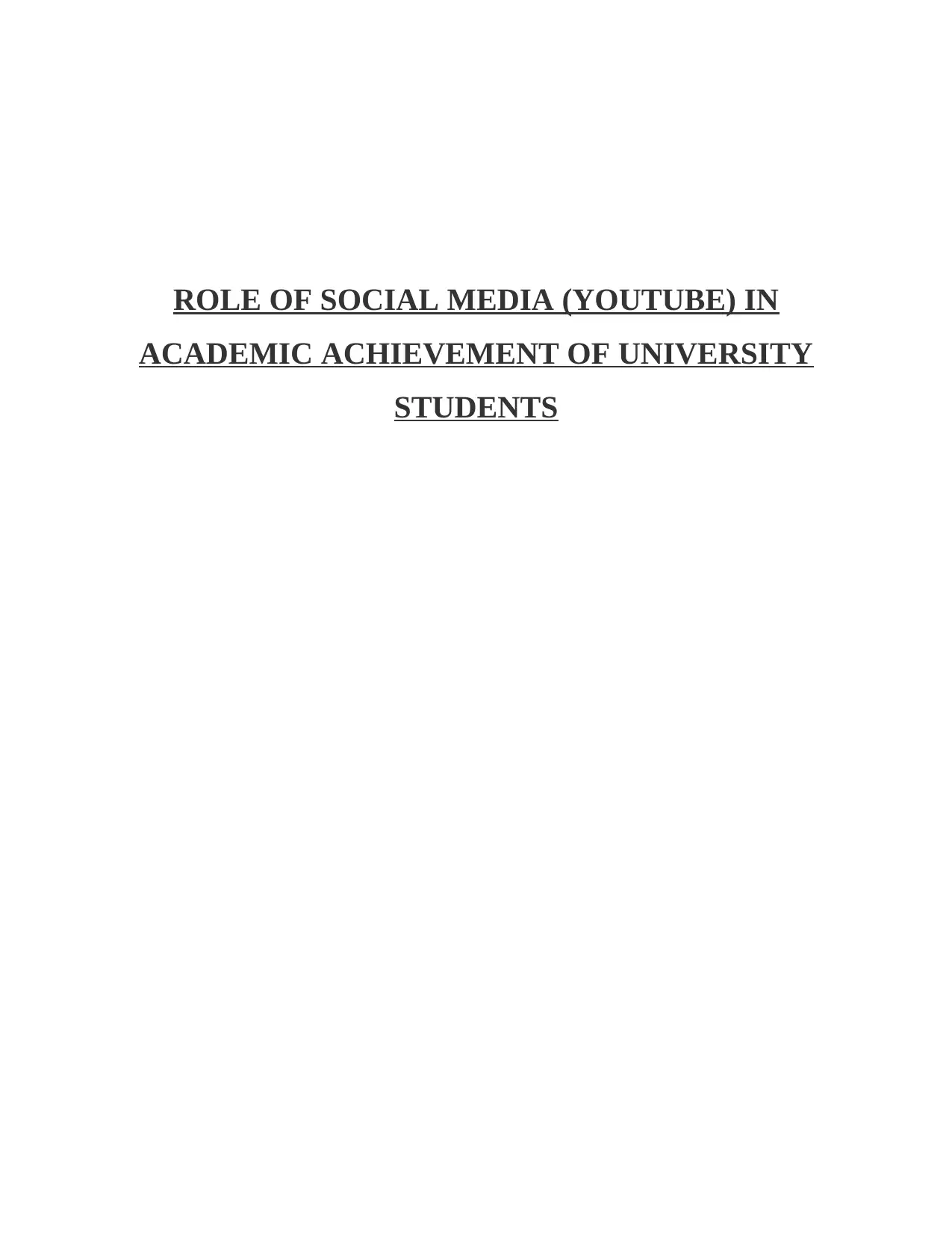
ROLE OF SOCIAL MEDIA (YOUTUBE) IN
ACADEMIC ACHIEVEMENT OF UNIVERSITY
STUDENTS
ACADEMIC ACHIEVEMENT OF UNIVERSITY
STUDENTS
Paraphrase This Document
Need a fresh take? Get an instant paraphrase of this document with our AI Paraphraser
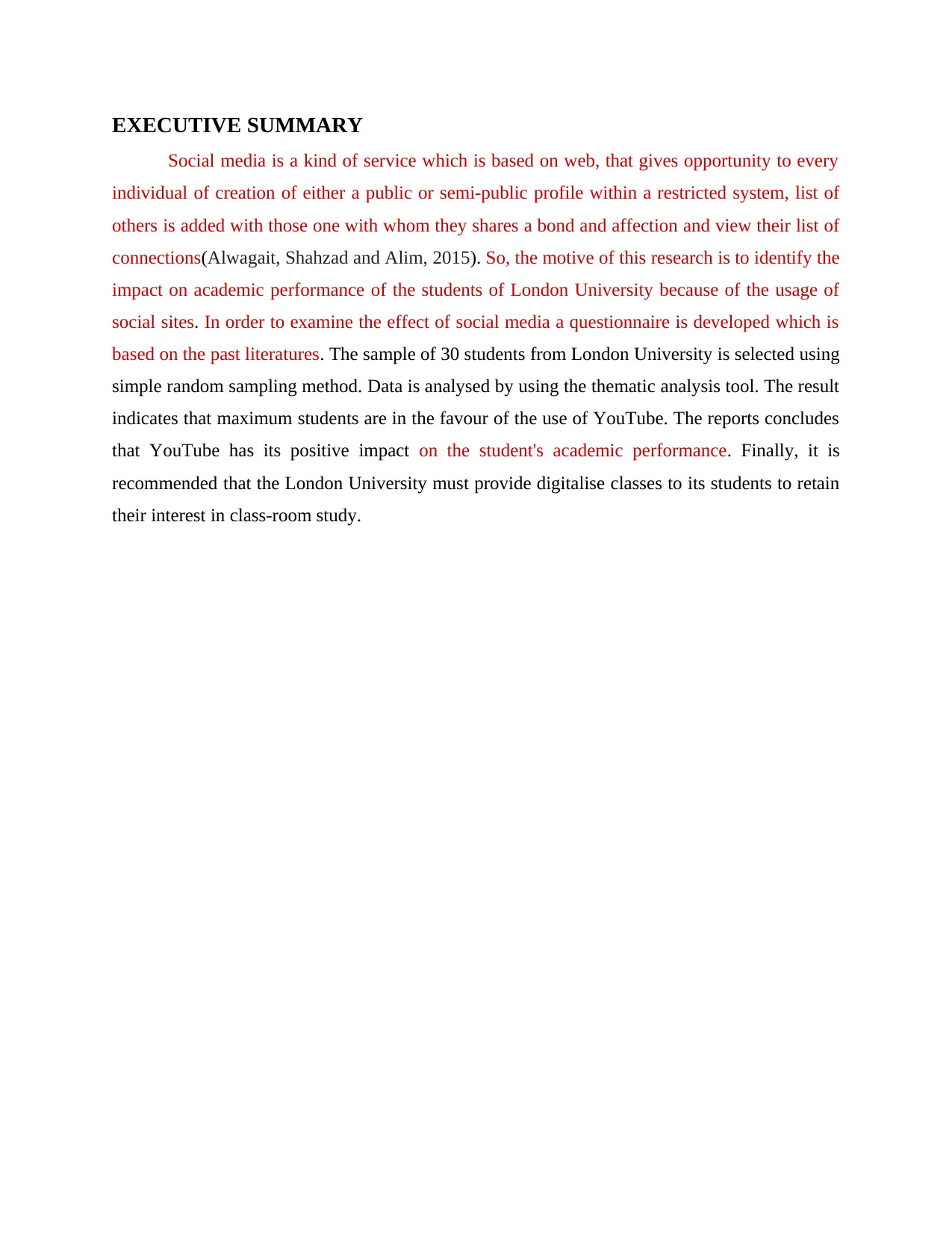
EXECUTIVE SUMMARY
Social media is a kind of service which is based on web, that gives opportunity to every
individual of creation of either a public or semi-public profile within a restricted system, list of
others is added with those one with whom they shares a bond and affection and view their list of
connections(Alwagait, Shahzad and Alim, 2015). So, the motive of this research is to identify the
impact on academic performance of the students of London University because of the usage of
social sites. In order to examine the effect of social media a questionnaire is developed which is
based on the past literatures. The sample of 30 students from London University is selected using
simple random sampling method. Data is analysed by using the thematic analysis tool. The result
indicates that maximum students are in the favour of the use of YouTube. The reports concludes
that YouTube has its positive impact on the student's academic performance. Finally, it is
recommended that the London University must provide digitalise classes to its students to retain
their interest in class-room study.
Social media is a kind of service which is based on web, that gives opportunity to every
individual of creation of either a public or semi-public profile within a restricted system, list of
others is added with those one with whom they shares a bond and affection and view their list of
connections(Alwagait, Shahzad and Alim, 2015). So, the motive of this research is to identify the
impact on academic performance of the students of London University because of the usage of
social sites. In order to examine the effect of social media a questionnaire is developed which is
based on the past literatures. The sample of 30 students from London University is selected using
simple random sampling method. Data is analysed by using the thematic analysis tool. The result
indicates that maximum students are in the favour of the use of YouTube. The reports concludes
that YouTube has its positive impact on the student's academic performance. Finally, it is
recommended that the London University must provide digitalise classes to its students to retain
their interest in class-room study.
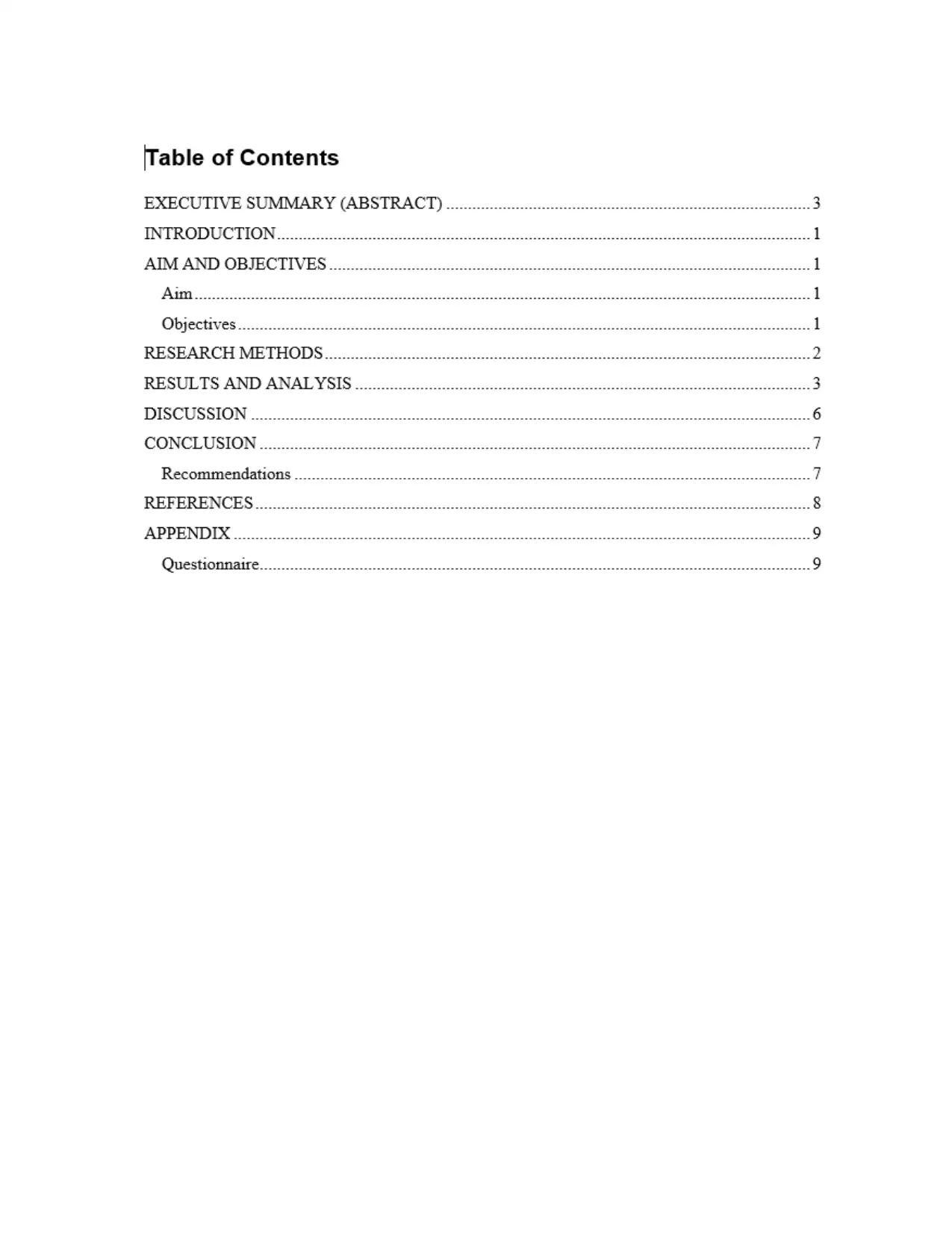
⊘ This is a preview!⊘
Do you want full access?
Subscribe today to unlock all pages.

Trusted by 1+ million students worldwide
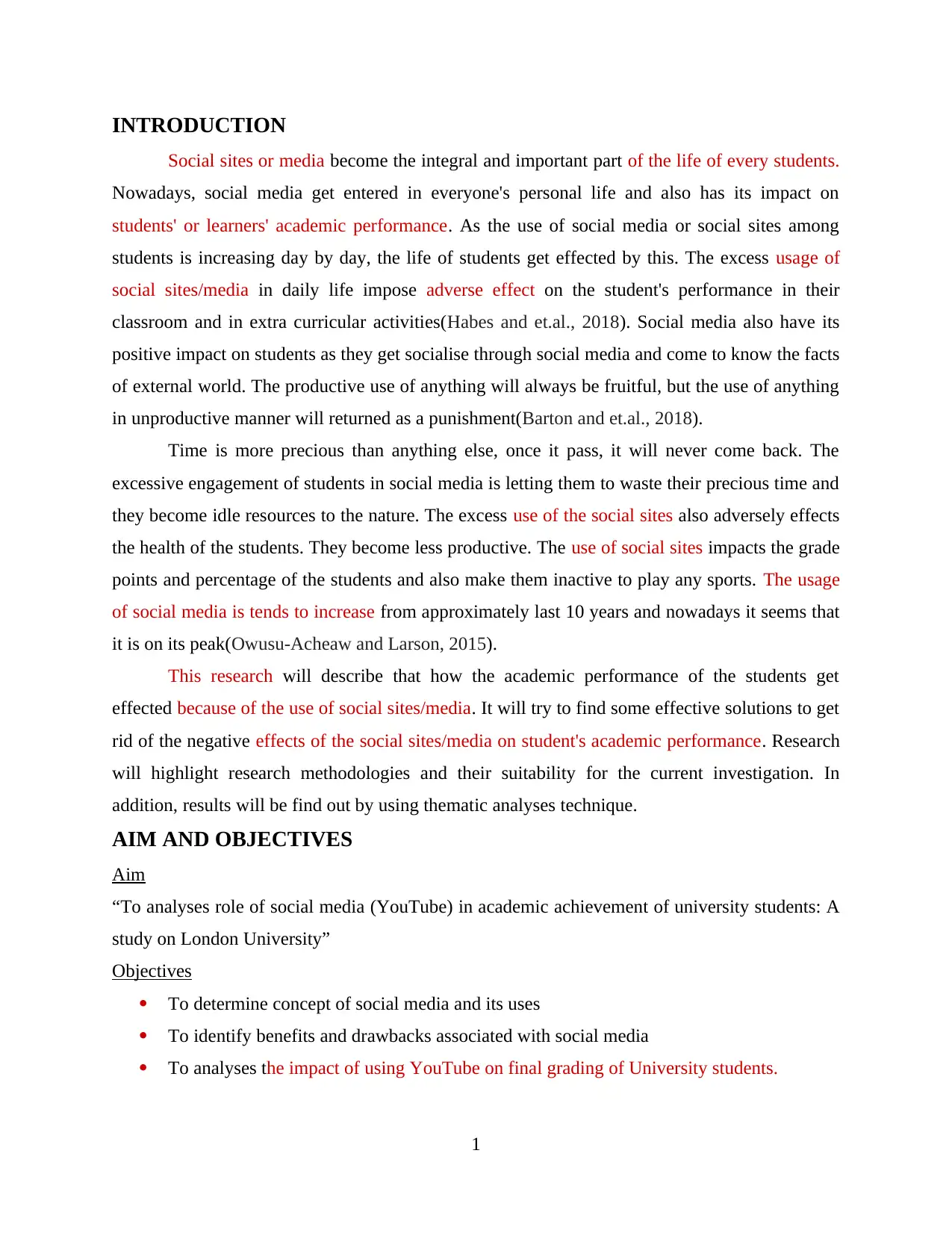
INTRODUCTION
Social sites or media become the integral and important part of the life of every students.
Nowadays, social media get entered in everyone's personal life and also has its impact on
students' or learners' academic performance. As the use of social media or social sites among
students is increasing day by day, the life of students get effected by this. The excess usage of
social sites/media in daily life impose adverse effect on the student's performance in their
classroom and in extra curricular activities(Habes and et.al., 2018). Social media also have its
positive impact on students as they get socialise through social media and come to know the facts
of external world. The productive use of anything will always be fruitful, but the use of anything
in unproductive manner will returned as a punishment(Barton and et.al., 2018).
Time is more precious than anything else, once it pass, it will never come back. The
excessive engagement of students in social media is letting them to waste their precious time and
they become idle resources to the nature. The excess use of the social sites also adversely effects
the health of the students. They become less productive. The use of social sites impacts the grade
points and percentage of the students and also make them inactive to play any sports. The usage
of social media is tends to increase from approximately last 10 years and nowadays it seems that
it is on its peak(Owusu-Acheaw and Larson, 2015).
This research will describe that how the academic performance of the students get
effected because of the use of social sites/media. It will try to find some effective solutions to get
rid of the negative effects of the social sites/media on student's academic performance. Research
will highlight research methodologies and their suitability for the current investigation. In
addition, results will be find out by using thematic analyses technique.
AIM AND OBJECTIVES
Aim
“To analyses role of social media (YouTube) in academic achievement of university students: A
study on London University”
Objectives
To determine concept of social media and its uses
To identify benefits and drawbacks associated with social media
To analyses the impact of using YouTube on final grading of University students.
1
Social sites or media become the integral and important part of the life of every students.
Nowadays, social media get entered in everyone's personal life and also has its impact on
students' or learners' academic performance. As the use of social media or social sites among
students is increasing day by day, the life of students get effected by this. The excess usage of
social sites/media in daily life impose adverse effect on the student's performance in their
classroom and in extra curricular activities(Habes and et.al., 2018). Social media also have its
positive impact on students as they get socialise through social media and come to know the facts
of external world. The productive use of anything will always be fruitful, but the use of anything
in unproductive manner will returned as a punishment(Barton and et.al., 2018).
Time is more precious than anything else, once it pass, it will never come back. The
excessive engagement of students in social media is letting them to waste their precious time and
they become idle resources to the nature. The excess use of the social sites also adversely effects
the health of the students. They become less productive. The use of social sites impacts the grade
points and percentage of the students and also make them inactive to play any sports. The usage
of social media is tends to increase from approximately last 10 years and nowadays it seems that
it is on its peak(Owusu-Acheaw and Larson, 2015).
This research will describe that how the academic performance of the students get
effected because of the use of social sites/media. It will try to find some effective solutions to get
rid of the negative effects of the social sites/media on student's academic performance. Research
will highlight research methodologies and their suitability for the current investigation. In
addition, results will be find out by using thematic analyses technique.
AIM AND OBJECTIVES
Aim
“To analyses role of social media (YouTube) in academic achievement of university students: A
study on London University”
Objectives
To determine concept of social media and its uses
To identify benefits and drawbacks associated with social media
To analyses the impact of using YouTube on final grading of University students.
1
Paraphrase This Document
Need a fresh take? Get an instant paraphrase of this document with our AI Paraphraser
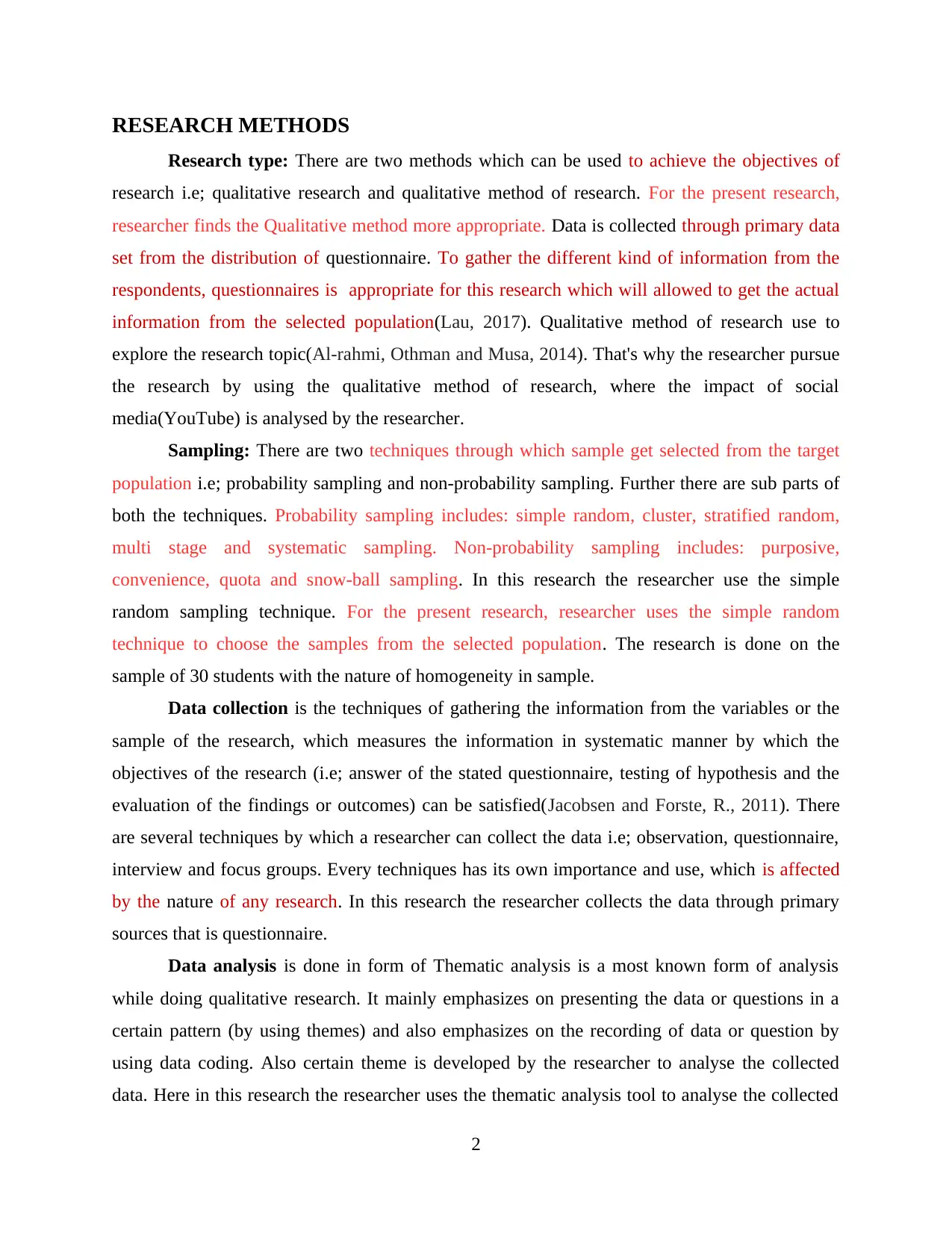
RESEARCH METHODS
Research type: There are two methods which can be used to achieve the objectives of
research i.e; qualitative research and qualitative method of research. For the present research,
researcher finds the Qualitative method more appropriate. Data is collected through primary data
set from the distribution of questionnaire. To gather the different kind of information from the
respondents, questionnaires is appropriate for this research which will allowed to get the actual
information from the selected population(Lau, 2017). Qualitative method of research use to
explore the research topic(Al-rahmi, Othman and Musa, 2014). That's why the researcher pursue
the research by using the qualitative method of research, where the impact of social
media(YouTube) is analysed by the researcher.
Sampling: There are two techniques through which sample get selected from the target
population i.e; probability sampling and non-probability sampling. Further there are sub parts of
both the techniques. Probability sampling includes: simple random, cluster, stratified random,
multi stage and systematic sampling. Non-probability sampling includes: purposive,
convenience, quota and snow-ball sampling. In this research the researcher use the simple
random sampling technique. For the present research, researcher uses the simple random
technique to choose the samples from the selected population. The research is done on the
sample of 30 students with the nature of homogeneity in sample.
Data collection is the techniques of gathering the information from the variables or the
sample of the research, which measures the information in systematic manner by which the
objectives of the research (i.e; answer of the stated questionnaire, testing of hypothesis and the
evaluation of the findings or outcomes) can be satisfied(Jacobsen and Forste, R., 2011). There
are several techniques by which a researcher can collect the data i.e; observation, questionnaire,
interview and focus groups. Every techniques has its own importance and use, which is affected
by the nature of any research. In this research the researcher collects the data through primary
sources that is questionnaire.
Data analysis is done in form of Thematic analysis is a most known form of analysis
while doing qualitative research. It mainly emphasizes on presenting the data or questions in a
certain pattern (by using themes) and also emphasizes on the recording of data or question by
using data coding. Also certain theme is developed by the researcher to analyse the collected
data. Here in this research the researcher uses the thematic analysis tool to analyse the collected
2
Research type: There are two methods which can be used to achieve the objectives of
research i.e; qualitative research and qualitative method of research. For the present research,
researcher finds the Qualitative method more appropriate. Data is collected through primary data
set from the distribution of questionnaire. To gather the different kind of information from the
respondents, questionnaires is appropriate for this research which will allowed to get the actual
information from the selected population(Lau, 2017). Qualitative method of research use to
explore the research topic(Al-rahmi, Othman and Musa, 2014). That's why the researcher pursue
the research by using the qualitative method of research, where the impact of social
media(YouTube) is analysed by the researcher.
Sampling: There are two techniques through which sample get selected from the target
population i.e; probability sampling and non-probability sampling. Further there are sub parts of
both the techniques. Probability sampling includes: simple random, cluster, stratified random,
multi stage and systematic sampling. Non-probability sampling includes: purposive,
convenience, quota and snow-ball sampling. In this research the researcher use the simple
random sampling technique. For the present research, researcher uses the simple random
technique to choose the samples from the selected population. The research is done on the
sample of 30 students with the nature of homogeneity in sample.
Data collection is the techniques of gathering the information from the variables or the
sample of the research, which measures the information in systematic manner by which the
objectives of the research (i.e; answer of the stated questionnaire, testing of hypothesis and the
evaluation of the findings or outcomes) can be satisfied(Jacobsen and Forste, R., 2011). There
are several techniques by which a researcher can collect the data i.e; observation, questionnaire,
interview and focus groups. Every techniques has its own importance and use, which is affected
by the nature of any research. In this research the researcher collects the data through primary
sources that is questionnaire.
Data analysis is done in form of Thematic analysis is a most known form of analysis
while doing qualitative research. It mainly emphasizes on presenting the data or questions in a
certain pattern (by using themes) and also emphasizes on the recording of data or question by
using data coding. Also certain theme is developed by the researcher to analyse the collected
data. Here in this research the researcher uses the thematic analysis tool to analyse the collected
2
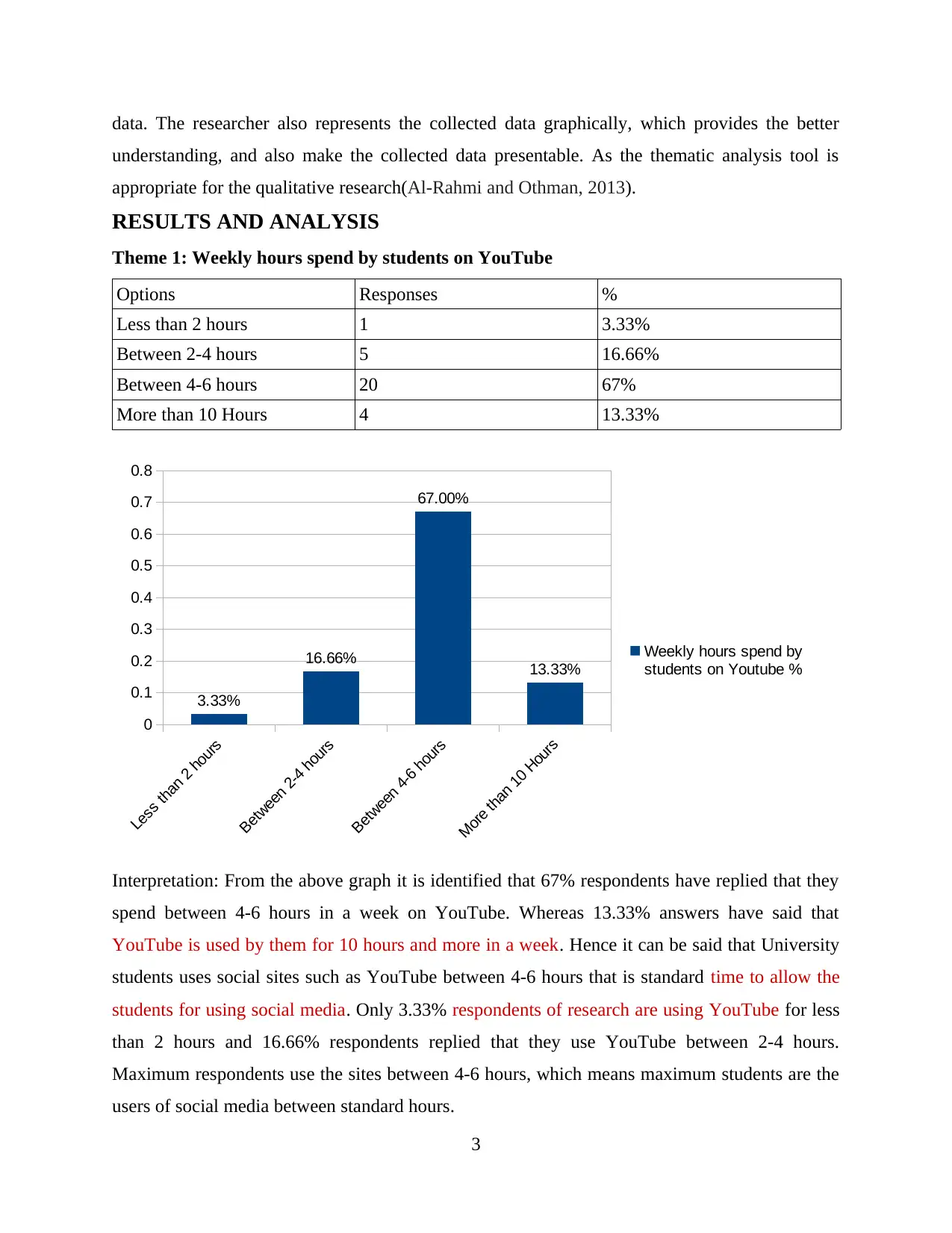
data. The researcher also represents the collected data graphically, which provides the better
understanding, and also make the collected data presentable. As the thematic analysis tool is
appropriate for the qualitative research(Al-Rahmi and Othman, 2013).
RESULTS AND ANALYSIS
Theme 1: Weekly hours spend by students on YouTube
Options Responses %
Less than 2 hours 1 3.33%
Between 2-4 hours 5 16.66%
Between 4-6 hours 20 67%
More than 10 Hours 4 13.33%
Less than 2 hours
Between 2-4 hours
Between 4-6 hours
More than 10 Hours
0
0.1
0.2
0.3
0.4
0.5
0.6
0.7
0.8
3.33%
16.66%
67.00%
13.33%
Weekly hours spend by
students on Youtube %
Interpretation: From the above graph it is identified that 67% respondents have replied that they
spend between 4-6 hours in a week on YouTube. Whereas 13.33% answers have said that
YouTube is used by them for 10 hours and more in a week. Hence it can be said that University
students uses social sites such as YouTube between 4-6 hours that is standard time to allow the
students for using social media. Only 3.33% respondents of research are using YouTube for less
than 2 hours and 16.66% respondents replied that they use YouTube between 2-4 hours.
Maximum respondents use the sites between 4-6 hours, which means maximum students are the
users of social media between standard hours.
3
understanding, and also make the collected data presentable. As the thematic analysis tool is
appropriate for the qualitative research(Al-Rahmi and Othman, 2013).
RESULTS AND ANALYSIS
Theme 1: Weekly hours spend by students on YouTube
Options Responses %
Less than 2 hours 1 3.33%
Between 2-4 hours 5 16.66%
Between 4-6 hours 20 67%
More than 10 Hours 4 13.33%
Less than 2 hours
Between 2-4 hours
Between 4-6 hours
More than 10 Hours
0
0.1
0.2
0.3
0.4
0.5
0.6
0.7
0.8
3.33%
16.66%
67.00%
13.33%
Weekly hours spend by
students on Youtube %
Interpretation: From the above graph it is identified that 67% respondents have replied that they
spend between 4-6 hours in a week on YouTube. Whereas 13.33% answers have said that
YouTube is used by them for 10 hours and more in a week. Hence it can be said that University
students uses social sites such as YouTube between 4-6 hours that is standard time to allow the
students for using social media. Only 3.33% respondents of research are using YouTube for less
than 2 hours and 16.66% respondents replied that they use YouTube between 2-4 hours.
Maximum respondents use the sites between 4-6 hours, which means maximum students are the
users of social media between standard hours.
3
⊘ This is a preview!⊘
Do you want full access?
Subscribe today to unlock all pages.

Trusted by 1+ million students worldwide
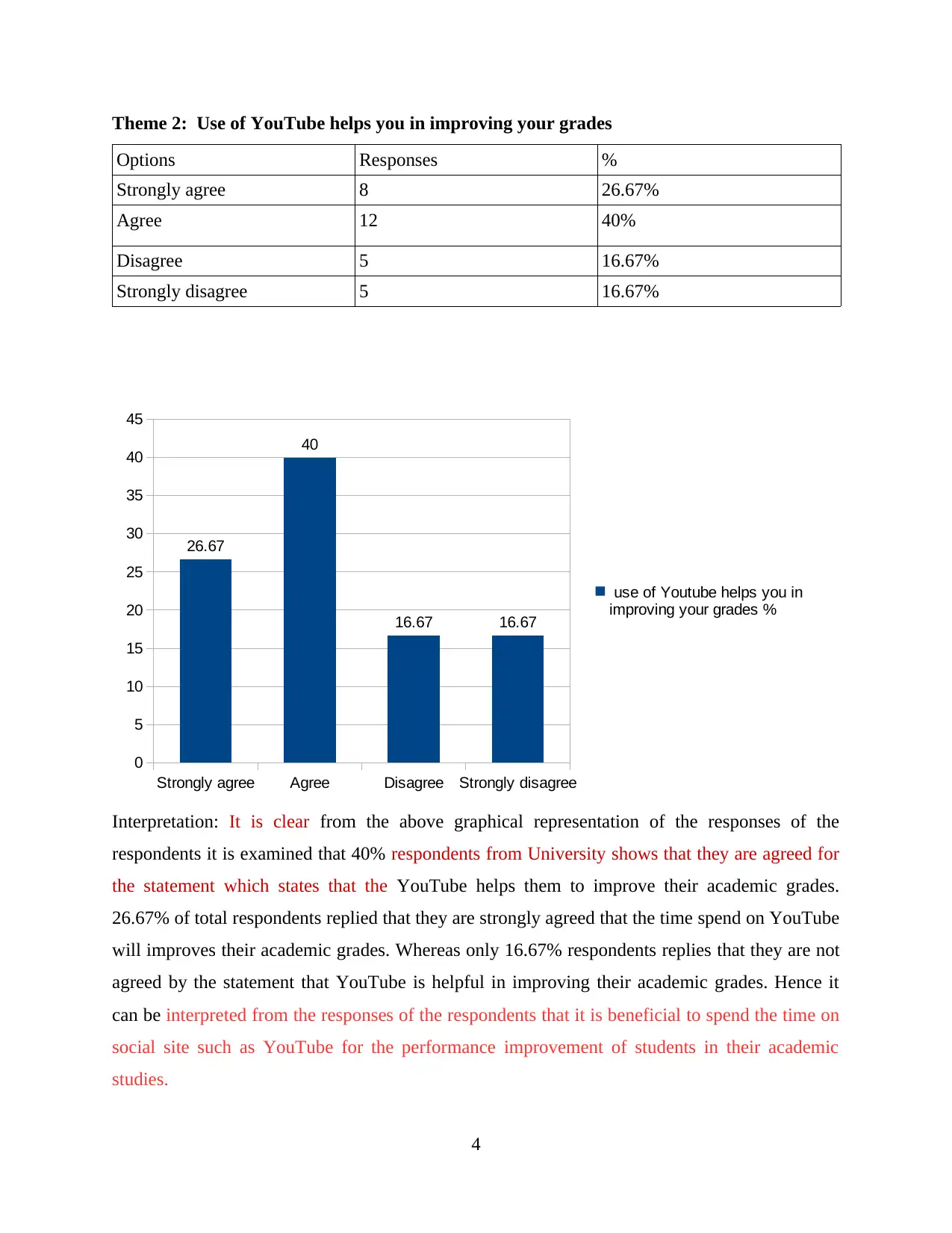
Theme 2: Use of YouTube helps you in improving your grades
Options Responses %
Strongly agree 8 26.67%
Agree 12 40%
Disagree 5 16.67%
Strongly disagree 5 16.67%
Strongly agree Agree Disagree Strongly disagree
0
5
10
15
20
25
30
35
40
45
26.67
40
16.67 16.67
use of Youtube helps you in
improving your grades %
Interpretation: It is clear from the above graphical representation of the responses of the
respondents it is examined that 40% respondents from University shows that they are agreed for
the statement which states that the YouTube helps them to improve their academic grades.
26.67% of total respondents replied that they are strongly agreed that the time spend on YouTube
will improves their academic grades. Whereas only 16.67% respondents replies that they are not
agreed by the statement that YouTube is helpful in improving their academic grades. Hence it
can be interpreted from the responses of the respondents that it is beneficial to spend the time on
social site such as YouTube for the performance improvement of students in their academic
studies.
4
Options Responses %
Strongly agree 8 26.67%
Agree 12 40%
Disagree 5 16.67%
Strongly disagree 5 16.67%
Strongly agree Agree Disagree Strongly disagree
0
5
10
15
20
25
30
35
40
45
26.67
40
16.67 16.67
use of Youtube helps you in
improving your grades %
Interpretation: It is clear from the above graphical representation of the responses of the
respondents it is examined that 40% respondents from University shows that they are agreed for
the statement which states that the YouTube helps them to improve their academic grades.
26.67% of total respondents replied that they are strongly agreed that the time spend on YouTube
will improves their academic grades. Whereas only 16.67% respondents replies that they are not
agreed by the statement that YouTube is helpful in improving their academic grades. Hence it
can be interpreted from the responses of the respondents that it is beneficial to spend the time on
social site such as YouTube for the performance improvement of students in their academic
studies.
4
Paraphrase This Document
Need a fresh take? Get an instant paraphrase of this document with our AI Paraphraser
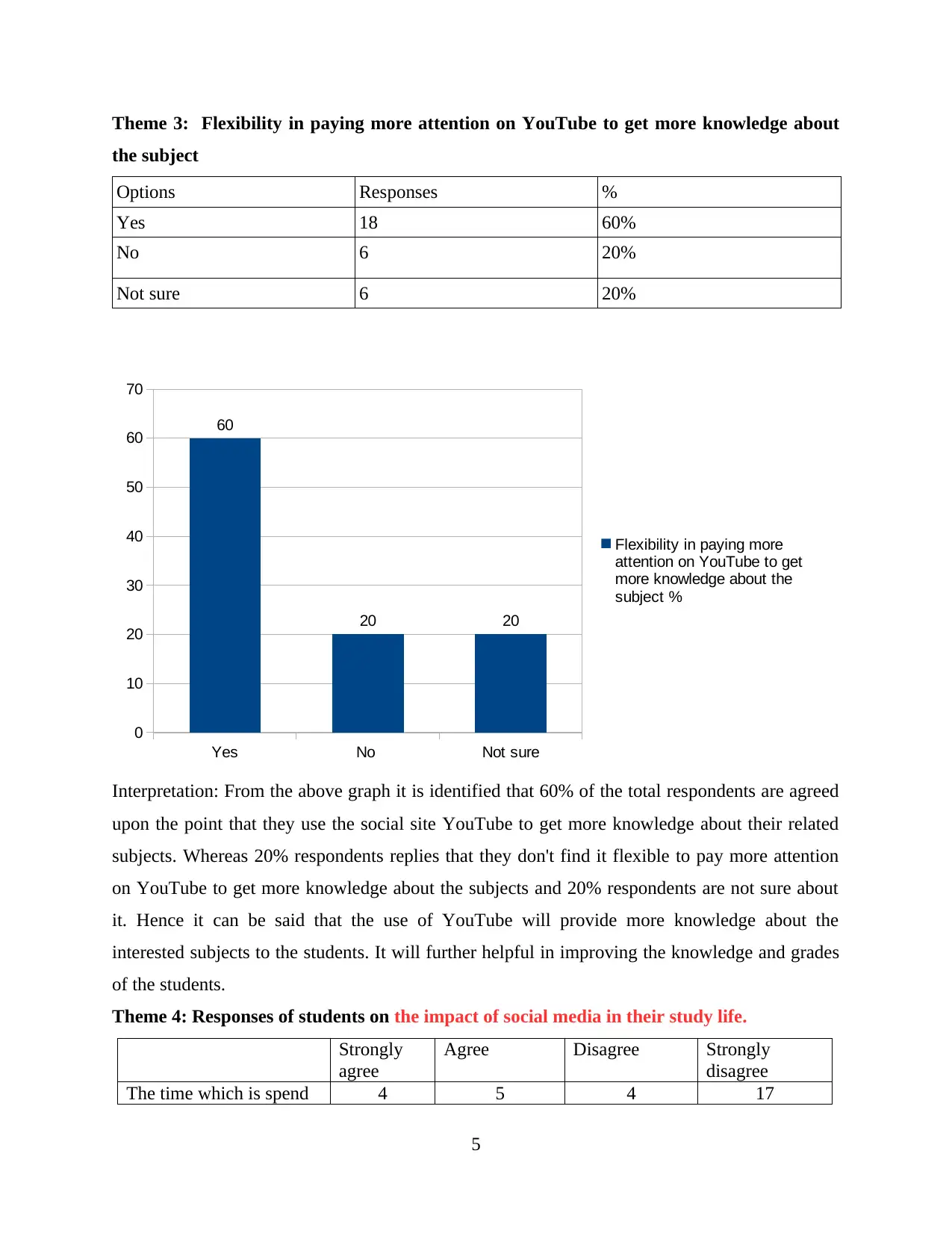
Theme 3: Flexibility in paying more attention on YouTube to get more knowledge about
the subject
Options Responses %
Yes 18 60%
No 6 20%
Not sure 6 20%
Yes No Not sure
0
10
20
30
40
50
60
70
60
20 20
Flexibility in paying more
attention on YouTube to get
more knowledge about the
subject %
Interpretation: From the above graph it is identified that 60% of the total respondents are agreed
upon the point that they use the social site YouTube to get more knowledge about their related
subjects. Whereas 20% respondents replies that they don't find it flexible to pay more attention
on YouTube to get more knowledge about the subjects and 20% respondents are not sure about
it. Hence it can be said that the use of YouTube will provide more knowledge about the
interested subjects to the students. It will further helpful in improving the knowledge and grades
of the students.
Theme 4: Responses of students on the impact of social media in their study life.
Strongly
agree
Agree Disagree Strongly
disagree
The time which is spend 4 5 4 17
5
the subject
Options Responses %
Yes 18 60%
No 6 20%
Not sure 6 20%
Yes No Not sure
0
10
20
30
40
50
60
70
60
20 20
Flexibility in paying more
attention on YouTube to get
more knowledge about the
subject %
Interpretation: From the above graph it is identified that 60% of the total respondents are agreed
upon the point that they use the social site YouTube to get more knowledge about their related
subjects. Whereas 20% respondents replies that they don't find it flexible to pay more attention
on YouTube to get more knowledge about the subjects and 20% respondents are not sure about
it. Hence it can be said that the use of YouTube will provide more knowledge about the
interested subjects to the students. It will further helpful in improving the knowledge and grades
of the students.
Theme 4: Responses of students on the impact of social media in their study life.
Strongly
agree
Agree Disagree Strongly
disagree
The time which is spend 4 5 4 17
5
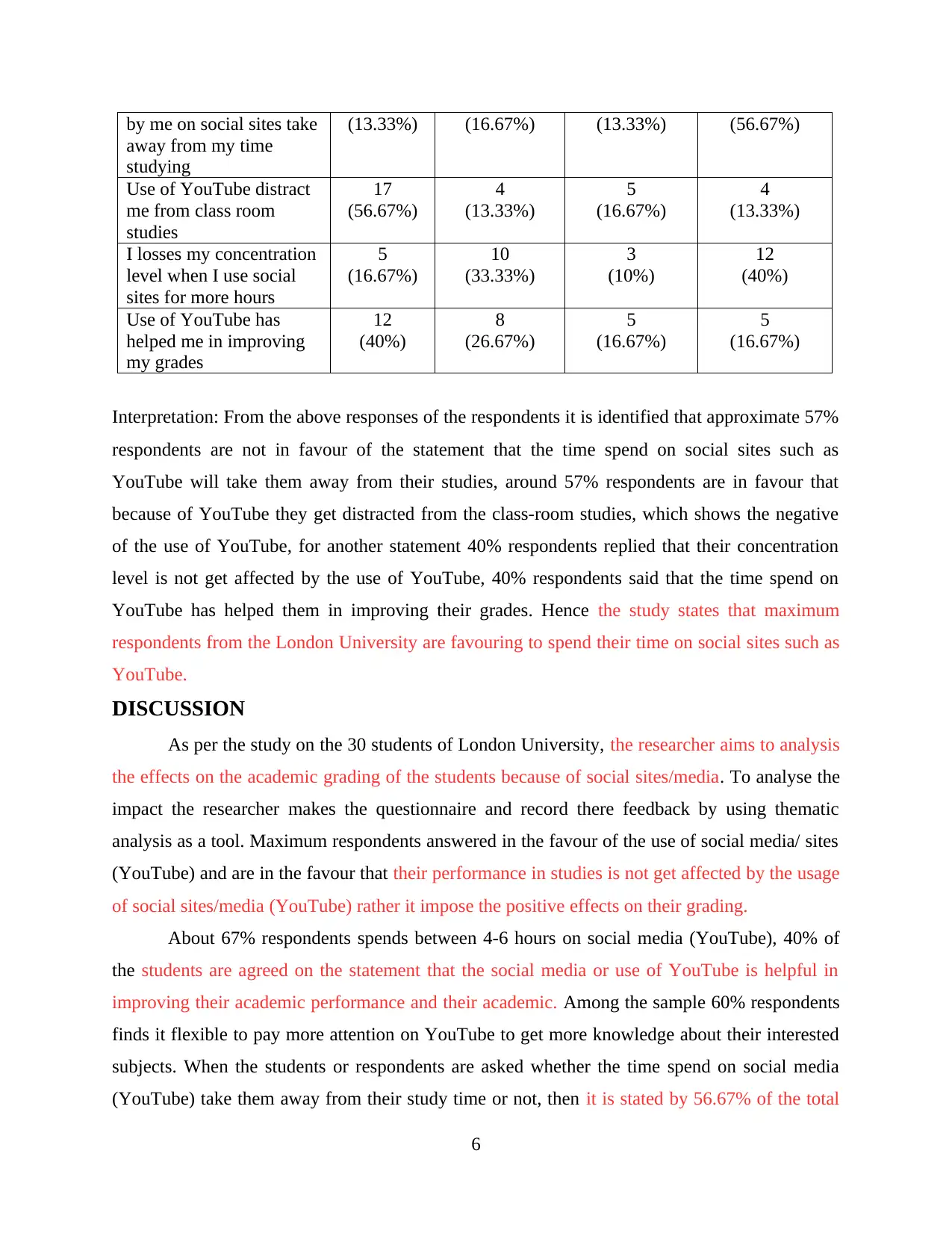
by me on social sites take
away from my time
studying
(13.33%) (16.67%) (13.33%) (56.67%)
Use of YouTube distract
me from class room
studies
17
(56.67%)
4
(13.33%)
5
(16.67%)
4
(13.33%)
I losses my concentration
level when I use social
sites for more hours
5
(16.67%)
10
(33.33%)
3
(10%)
12
(40%)
Use of YouTube has
helped me in improving
my grades
12
(40%)
8
(26.67%)
5
(16.67%)
5
(16.67%)
Interpretation: From the above responses of the respondents it is identified that approximate 57%
respondents are not in favour of the statement that the time spend on social sites such as
YouTube will take them away from their studies, around 57% respondents are in favour that
because of YouTube they get distracted from the class-room studies, which shows the negative
of the use of YouTube, for another statement 40% respondents replied that their concentration
level is not get affected by the use of YouTube, 40% respondents said that the time spend on
YouTube has helped them in improving their grades. Hence the study states that maximum
respondents from the London University are favouring to spend their time on social sites such as
YouTube.
DISCUSSION
As per the study on the 30 students of London University, the researcher aims to analysis
the effects on the academic grading of the students because of social sites/media. To analyse the
impact the researcher makes the questionnaire and record there feedback by using thematic
analysis as a tool. Maximum respondents answered in the favour of the use of social media/ sites
(YouTube) and are in the favour that their performance in studies is not get affected by the usage
of social sites/media (YouTube) rather it impose the positive effects on their grading.
About 67% respondents spends between 4-6 hours on social media (YouTube), 40% of
the students are agreed on the statement that the social media or use of YouTube is helpful in
improving their academic performance and their academic. Among the sample 60% respondents
finds it flexible to pay more attention on YouTube to get more knowledge about their interested
subjects. When the students or respondents are asked whether the time spend on social media
(YouTube) take them away from their study time or not, then it is stated by 56.67% of the total
6
away from my time
studying
(13.33%) (16.67%) (13.33%) (56.67%)
Use of YouTube distract
me from class room
studies
17
(56.67%)
4
(13.33%)
5
(16.67%)
4
(13.33%)
I losses my concentration
level when I use social
sites for more hours
5
(16.67%)
10
(33.33%)
3
(10%)
12
(40%)
Use of YouTube has
helped me in improving
my grades
12
(40%)
8
(26.67%)
5
(16.67%)
5
(16.67%)
Interpretation: From the above responses of the respondents it is identified that approximate 57%
respondents are not in favour of the statement that the time spend on social sites such as
YouTube will take them away from their studies, around 57% respondents are in favour that
because of YouTube they get distracted from the class-room studies, which shows the negative
of the use of YouTube, for another statement 40% respondents replied that their concentration
level is not get affected by the use of YouTube, 40% respondents said that the time spend on
YouTube has helped them in improving their grades. Hence the study states that maximum
respondents from the London University are favouring to spend their time on social sites such as
YouTube.
DISCUSSION
As per the study on the 30 students of London University, the researcher aims to analysis
the effects on the academic grading of the students because of social sites/media. To analyse the
impact the researcher makes the questionnaire and record there feedback by using thematic
analysis as a tool. Maximum respondents answered in the favour of the use of social media/ sites
(YouTube) and are in the favour that their performance in studies is not get affected by the usage
of social sites/media (YouTube) rather it impose the positive effects on their grading.
About 67% respondents spends between 4-6 hours on social media (YouTube), 40% of
the students are agreed on the statement that the social media or use of YouTube is helpful in
improving their academic performance and their academic. Among the sample 60% respondents
finds it flexible to pay more attention on YouTube to get more knowledge about their interested
subjects. When the students or respondents are asked whether the time spend on social media
(YouTube) take them away from their study time or not, then it is stated by 56.67% of the total
6
⊘ This is a preview!⊘
Do you want full access?
Subscribe today to unlock all pages.

Trusted by 1+ million students worldwide
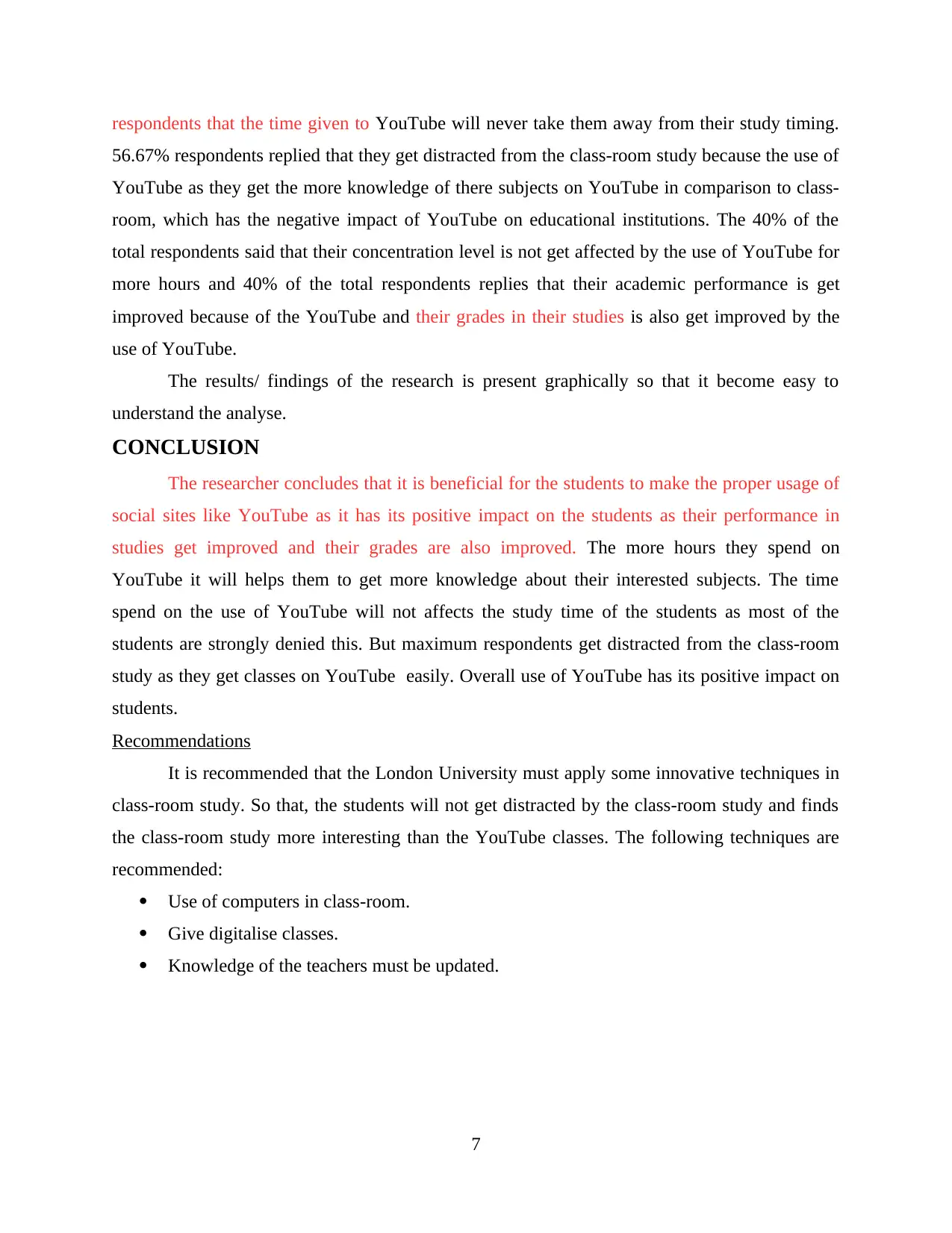
respondents that the time given to YouTube will never take them away from their study timing.
56.67% respondents replied that they get distracted from the class-room study because the use of
YouTube as they get the more knowledge of there subjects on YouTube in comparison to class-
room, which has the negative impact of YouTube on educational institutions. The 40% of the
total respondents said that their concentration level is not get affected by the use of YouTube for
more hours and 40% of the total respondents replies that their academic performance is get
improved because of the YouTube and their grades in their studies is also get improved by the
use of YouTube.
The results/ findings of the research is present graphically so that it become easy to
understand the analyse.
CONCLUSION
The researcher concludes that it is beneficial for the students to make the proper usage of
social sites like YouTube as it has its positive impact on the students as their performance in
studies get improved and their grades are also improved. The more hours they spend on
YouTube it will helps them to get more knowledge about their interested subjects. The time
spend on the use of YouTube will not affects the study time of the students as most of the
students are strongly denied this. But maximum respondents get distracted from the class-room
study as they get classes on YouTube easily. Overall use of YouTube has its positive impact on
students.
Recommendations
It is recommended that the London University must apply some innovative techniques in
class-room study. So that, the students will not get distracted by the class-room study and finds
the class-room study more interesting than the YouTube classes. The following techniques are
recommended:
Use of computers in class-room.
Give digitalise classes.
Knowledge of the teachers must be updated.
7
56.67% respondents replied that they get distracted from the class-room study because the use of
YouTube as they get the more knowledge of there subjects on YouTube in comparison to class-
room, which has the negative impact of YouTube on educational institutions. The 40% of the
total respondents said that their concentration level is not get affected by the use of YouTube for
more hours and 40% of the total respondents replies that their academic performance is get
improved because of the YouTube and their grades in their studies is also get improved by the
use of YouTube.
The results/ findings of the research is present graphically so that it become easy to
understand the analyse.
CONCLUSION
The researcher concludes that it is beneficial for the students to make the proper usage of
social sites like YouTube as it has its positive impact on the students as their performance in
studies get improved and their grades are also improved. The more hours they spend on
YouTube it will helps them to get more knowledge about their interested subjects. The time
spend on the use of YouTube will not affects the study time of the students as most of the
students are strongly denied this. But maximum respondents get distracted from the class-room
study as they get classes on YouTube easily. Overall use of YouTube has its positive impact on
students.
Recommendations
It is recommended that the London University must apply some innovative techniques in
class-room study. So that, the students will not get distracted by the class-room study and finds
the class-room study more interesting than the YouTube classes. The following techniques are
recommended:
Use of computers in class-room.
Give digitalise classes.
Knowledge of the teachers must be updated.
7
Paraphrase This Document
Need a fresh take? Get an instant paraphrase of this document with our AI Paraphraser
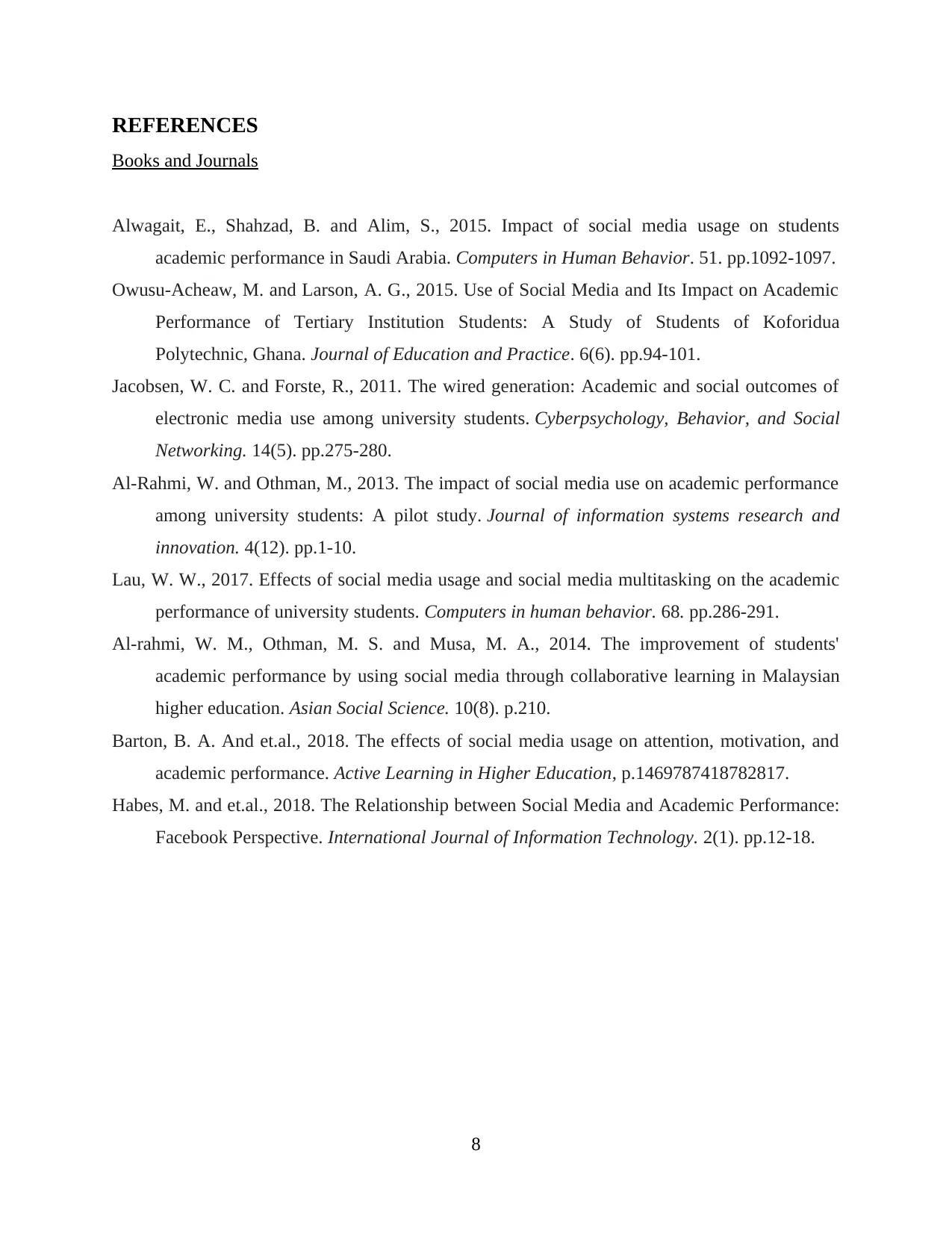
REFERENCES
Books and Journals
Alwagait, E., Shahzad, B. and Alim, S., 2015. Impact of social media usage on students
academic performance in Saudi Arabia. Computers in Human Behavior. 51. pp.1092-1097.
Owusu-Acheaw, M. and Larson, A. G., 2015. Use of Social Media and Its Impact on Academic
Performance of Tertiary Institution Students: A Study of Students of Koforidua
Polytechnic, Ghana. Journal of Education and Practice. 6(6). pp.94-101.
Jacobsen, W. C. and Forste, R., 2011. The wired generation: Academic and social outcomes of
electronic media use among university students. Cyberpsychology, Behavior, and Social
Networking. 14(5). pp.275-280.
Al-Rahmi, W. and Othman, M., 2013. The impact of social media use on academic performance
among university students: A pilot study. Journal of information systems research and
innovation. 4(12). pp.1-10.
Lau, W. W., 2017. Effects of social media usage and social media multitasking on the academic
performance of university students. Computers in human behavior. 68. pp.286-291.
Al-rahmi, W. M., Othman, M. S. and Musa, M. A., 2014. The improvement of students'
academic performance by using social media through collaborative learning in Malaysian
higher education. Asian Social Science. 10(8). p.210.
Barton, B. A. And et.al., 2018. The effects of social media usage on attention, motivation, and
academic performance. Active Learning in Higher Education, p.1469787418782817.
Habes, M. and et.al., 2018. The Relationship between Social Media and Academic Performance:
Facebook Perspective. International Journal of Information Technology. 2(1). pp.12-18.
8
Books and Journals
Alwagait, E., Shahzad, B. and Alim, S., 2015. Impact of social media usage on students
academic performance in Saudi Arabia. Computers in Human Behavior. 51. pp.1092-1097.
Owusu-Acheaw, M. and Larson, A. G., 2015. Use of Social Media and Its Impact on Academic
Performance of Tertiary Institution Students: A Study of Students of Koforidua
Polytechnic, Ghana. Journal of Education and Practice. 6(6). pp.94-101.
Jacobsen, W. C. and Forste, R., 2011. The wired generation: Academic and social outcomes of
electronic media use among university students. Cyberpsychology, Behavior, and Social
Networking. 14(5). pp.275-280.
Al-Rahmi, W. and Othman, M., 2013. The impact of social media use on academic performance
among university students: A pilot study. Journal of information systems research and
innovation. 4(12). pp.1-10.
Lau, W. W., 2017. Effects of social media usage and social media multitasking on the academic
performance of university students. Computers in human behavior. 68. pp.286-291.
Al-rahmi, W. M., Othman, M. S. and Musa, M. A., 2014. The improvement of students'
academic performance by using social media through collaborative learning in Malaysian
higher education. Asian Social Science. 10(8). p.210.
Barton, B. A. And et.al., 2018. The effects of social media usage on attention, motivation, and
academic performance. Active Learning in Higher Education, p.1469787418782817.
Habes, M. and et.al., 2018. The Relationship between Social Media and Academic Performance:
Facebook Perspective. International Journal of Information Technology. 2(1). pp.12-18.
8
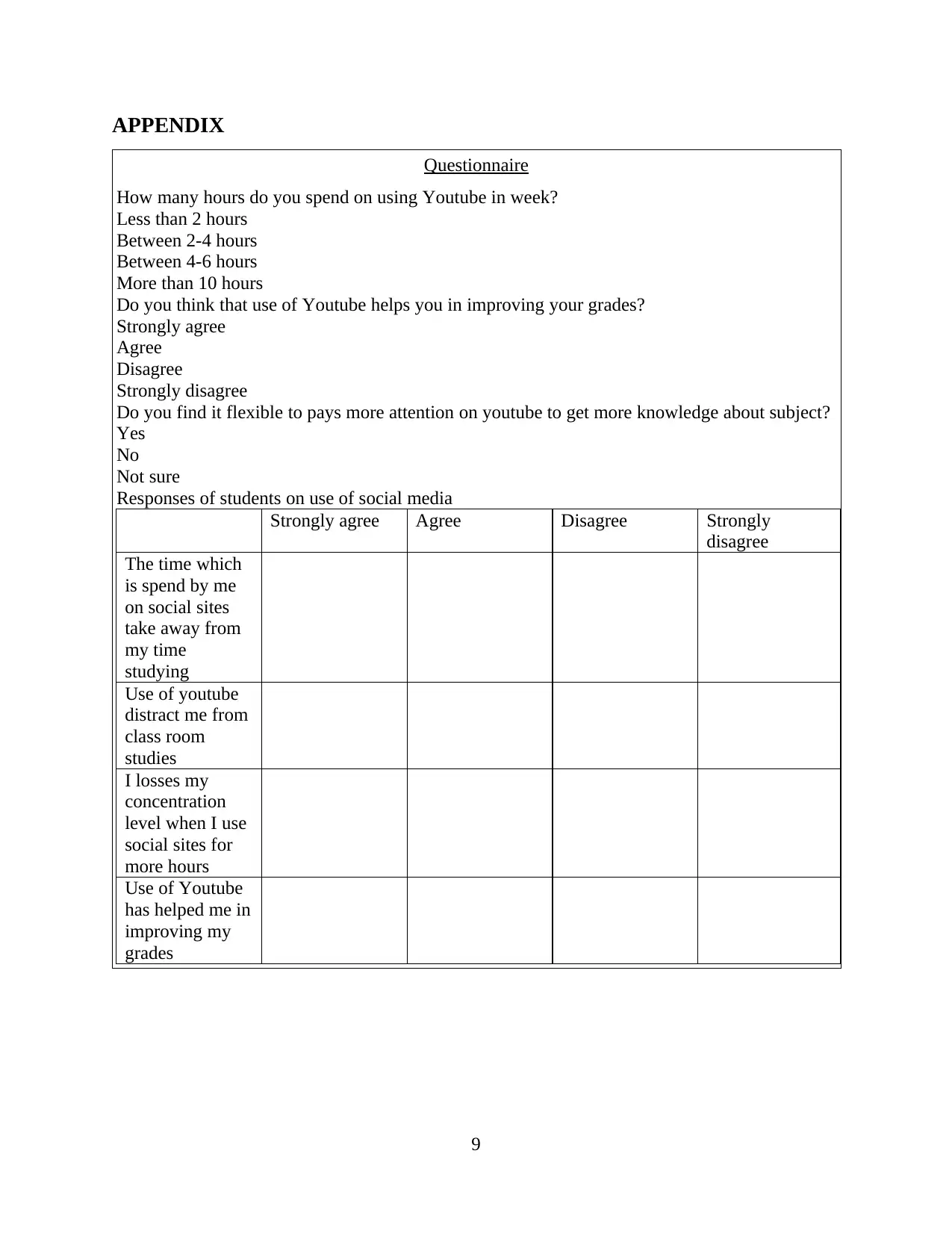
APPENDIX
Questionnaire
How many hours do you spend on using Youtube in week?
Less than 2 hours
Between 2-4 hours
Between 4-6 hours
More than 10 hours
Do you think that use of Youtube helps you in improving your grades?
Strongly agree
Agree
Disagree
Strongly disagree
Do you find it flexible to pays more attention on youtube to get more knowledge about subject?
Yes
No
Not sure
Responses of students on use of social media
Strongly agree Agree Disagree Strongly
disagree
The time which
is spend by me
on social sites
take away from
my time
studying
Use of youtube
distract me from
class room
studies
I losses my
concentration
level when I use
social sites for
more hours
Use of Youtube
has helped me in
improving my
grades
9
Questionnaire
How many hours do you spend on using Youtube in week?
Less than 2 hours
Between 2-4 hours
Between 4-6 hours
More than 10 hours
Do you think that use of Youtube helps you in improving your grades?
Strongly agree
Agree
Disagree
Strongly disagree
Do you find it flexible to pays more attention on youtube to get more knowledge about subject?
Yes
No
Not sure
Responses of students on use of social media
Strongly agree Agree Disagree Strongly
disagree
The time which
is spend by me
on social sites
take away from
my time
studying
Use of youtube
distract me from
class room
studies
I losses my
concentration
level when I use
social sites for
more hours
Use of Youtube
has helped me in
improving my
grades
9
⊘ This is a preview!⊘
Do you want full access?
Subscribe today to unlock all pages.

Trusted by 1+ million students worldwide
1 out of 12
Related Documents
Your All-in-One AI-Powered Toolkit for Academic Success.
+13062052269
info@desklib.com
Available 24*7 on WhatsApp / Email
![[object Object]](/_next/static/media/star-bottom.7253800d.svg)
Unlock your academic potential
Copyright © 2020–2025 A2Z Services. All Rights Reserved. Developed and managed by ZUCOL.




